Was the summer of liberalism really the dawn of Trump?
- Published
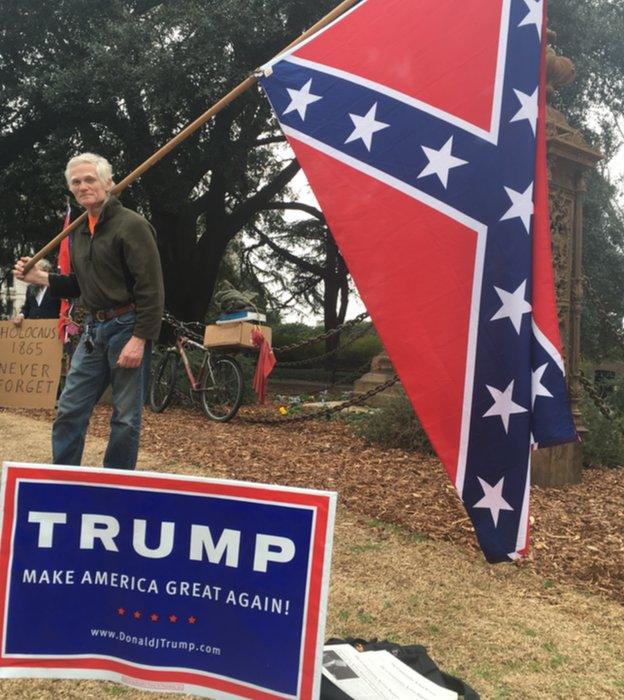
The United States of America. There have been times over these past seven days, and this past year, when the very name of this country has seemed at odds with its divergent mood.
Increasingly the USA seems oxymoronic, a geographic expression rather than a term to describe a cohesive republic, "one Nation under God, indivisible."
The election, rather than delivering an overwhelming endorsement of Donald Trump, produced a divided result. He won the Electoral College, the state-based mechanism designed, ironically, to stave off angry popular revolts. Hillary Clinton amassed more votes in the country as a whole.
The headline is that Donald Trump won, fairly and legitimately. The takeaway is that this election has highlighted divisions between the races, the classes, those who live in the countryside and those who live in the cities, and those who inhabit ocean-facing and land-locked states that have been growing ever more stark for decades. These disunions appear to have become a permanent feature of the American polity. The underlying story is a familiar one: of polarisation - or polarisation plus plus plus, to bastardise a Trumpism.
Many US citizens now feel more of an ideological kinship with Justin Trudeau's Canada than Donald Trump's America, which explains why the maple leaf country's immigration website crashed on election night and why memes are doing the rounds showing Washington, Oregon and California as adjuncts of British Columbia. Many Americans would endorse The Economist's cover from a few weeks back. "Liberty moves north."
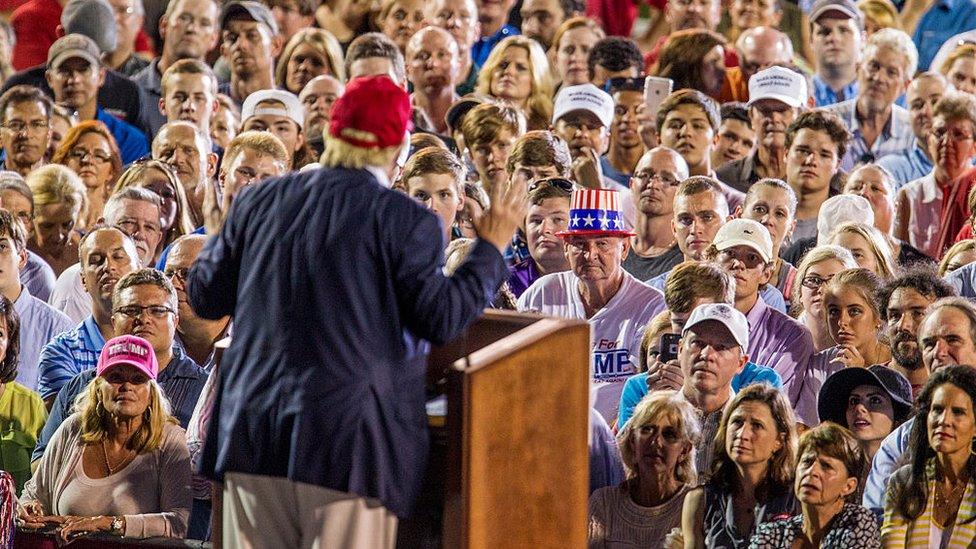
An early Trump rally in August 2015
Equally, many conservative voters in the south, the Rust Belt and the Bible Belt feel little or no affinity with the coastal, metropolitan elites: people who sneeringly look down on them, who cast them as deplorables.
In the aftermath of elections, the improbable is always written up as inevitable. In this false retelling, it seems obvious now that Trump was going to win. But this was a case of the politically impossible becoming real, and the unlikeliness of it all is still worth reflecting on.
Just consider what America looked like at the beginning of the billionaire's long march to the White House. Donald Trump declared for the presidency on 16 June, 2015. The following evening a 21-year-old called Dylann Roof walked into a church in Charleston, South Carolina, and gunned down nine African-American churchgoers attending a midweek bible study class. Days later it emerged that Roof had taken photographs of himself brandishing the Confederate flag.
The steeple of the Emanuel AME church can be seen from Fort Sumter in Charleston harbour, where the first shots of the American civil war rang out. Roof's actions were allegedly intended to spark another race war.
Over the coming weeks, as the awfulness of Roof's motivations and the hatefulness of his white supremacist iconography became clear, we witnessed an extraordinary transformation. The state of South Carolina, under the leadership of its Republican Indian-American governor Nikki Haley, announced that the Confederate flag that had flown, controversially, in the capital grounds would finally be furled.
On a swelteringly hot day, I watched as it was lowered, amidst jubilance and relief from local African-Americans, who had long regarded the battle flag of an army fighting to preserve slavery as a fabric of hate. That day it was tempting to view the coming down of that flag as the final surrender of the American civil war, the closing of a chapter in which white nationalists ended up again on the losing side.
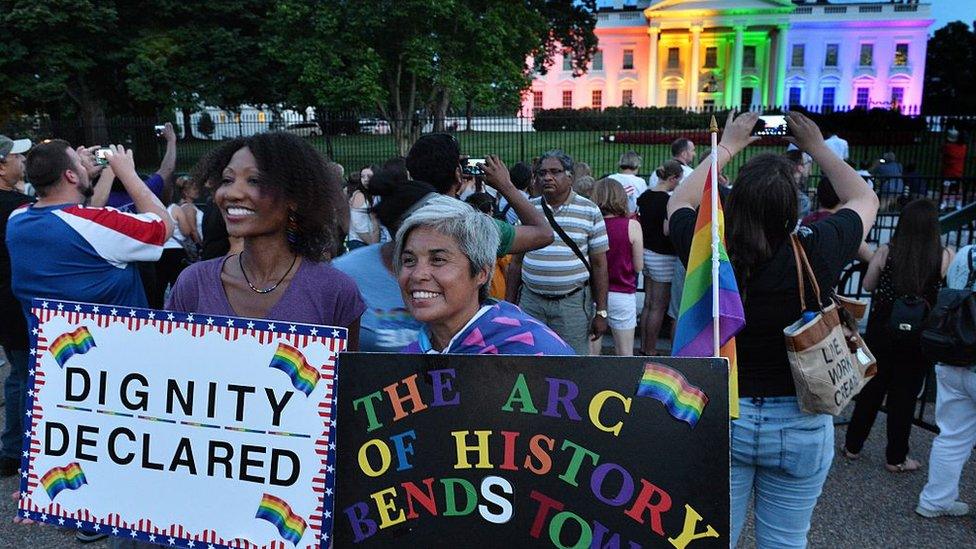
That entire summer was portrayed as a triumph of liberalism, the salad days of progressivism.
The Supreme Court, in a ruling likened to the momentous Brown decision that ended school segregation, decreed that gay marriage should be a nationwide right.
That very afternoon, Barack Obama flew to Charleston, leaving behind a White House about to be bathed in rainbow floodlights, where he delivered perhaps the most memorable oration of his presidency - one that ended with his singing of Amazing Grace. That month the Supreme Court also rejected a constitutional challenge to Obamacare, while Congress granted the president fast-track trade authority to negotiate the Trans-Pacific Partnership, his landmark Asian trade deal. June 2015, as I wrote at the time, seemed to bring about "the belated realisation of his 'Yes We Can' America." Having seemingly won the arguments, progressives thought they would retain the presidency.
However, these sunny uplands of liberalism doubled as a seedbed of Trumpism. When reporters returned from Charleston to New York and Washington a very different political story was starting to play out. Donald Trump had already established a lead in the race for the Republican presidential nomination, a lead he never really relinquished until he became the Republican presidential nominee.
Part of the reason why many of us missed the rise of Trump was because we misinterpreted the summer of 2015. Many of thought that the most historically meaningful event that was the lowering of the Confederate flag and all that it signified, when the truly transformative moment was when Donald Trump descended upon his golden elevator and launched his improbable bid for the presidency. That Amazing Grace summer will be remembered for being the Amazing Donald summer. What looked like a liberal "end of history" moment was also the start of the conservative comeback - what some have dubbed "the whitelash" began.
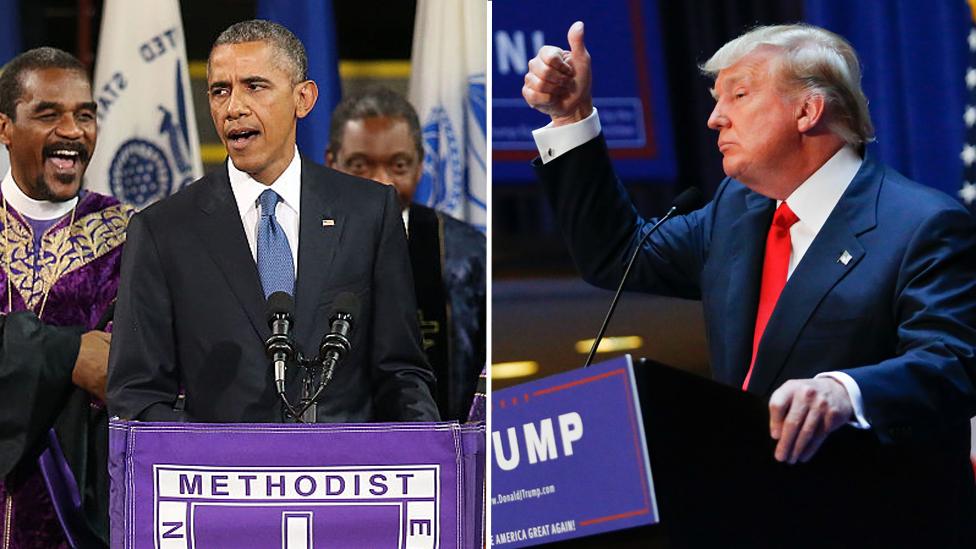
Certainly, Trump's early cry of "We don't win anymore" resonated with people who felt at the wrong end of that flag coming down, of gay marriage, of Obamacare and the accelerated globalisation of world trade that the TPP foreshadowed. The nativism of Trump's opening speech, which vilified Mexican immigrants as rapists and criminals, had obvious appeal for many angry whites.
Tellingly, much of Trump's early support came from white supremacists, as the New Yorker writer Evan Osnos documented in one of the brilliant early essays , externaltrying to make sense of his unexpected rise. As Osnos noted, 12 days after Trump declared for the presidency America's most popular neo-Nazi website, the Daily Stormer, endorsed him: "Trump is willing to say what most Americans think: it's time to deport these people".
Even before this, many white nationalists had already warmed to Trump because of his prominence in the Birther movement - what his advisor Roger Stone described as "a brilliant base-building move."
Trump's support among white nationalists grew steadily over the coming months. By February of the following year, David Duke, the former KKK Grand wizard, was arguing that voting against Trump "is really treason to your heritage." That same month I returned to South Carolina for the Republican primary to find a small gathering of Star and Bars diehards gathered outside the State Capitol building. Along with their Confederate flags, they were brandishing Trump placards. The very forces that the reaction to the Charleston shooting had seemingly vanquished were once again resurgent.
Donald Trump's victory does not mark the triumph of white nationalism, a twisted creed that seeks to identify America racially as a white nation. To characterise it as such would be ignore the millions of decent-minded voters who would wholly reject that kind of racism. But it was a triumph for the many white nationalists, who supported Trump from the start.
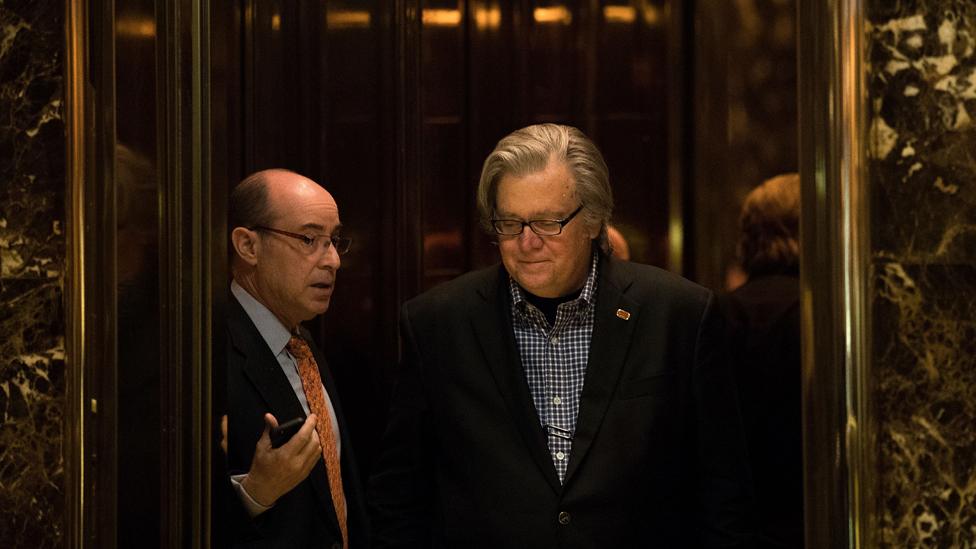
Steven Bannon in the elevator at Trump Tower
Since his unexpected victory, the president-elect has spoken soothing words rather than continuing with the incendiary language of his campaign, and pledged to bring this divided nation together. However, his appointment of Stephen Bannon as his chief White House strategist flies in the face of that.
Bannon's Breitbart website is beloved by many white nationalists. It has offered an outlet for far-right politicians, like the Dutch politician Geert Wilders, and a forum in which white nationalists have aired their grievances. In the aftermath of the Charleston church shooting, to cite a particularly germane example, it published an article entitled "Hoist it high and proud: The Confederate flag proclaims a glorious heritage."
The piece began: "The American left is in a feeding frenzy, cynically exploiting the tragic murders of nine black worshippers in a Charleston church to promote its agenda of cultural genocide against conservatism, tradition and the South."
Former Ku Klux Klan Grandmaster David Duke has called his appointment an "excellent" choice.
From slavery through to segregation and beyond, race has always been the main fault-line in American life and American politics, so the notion that election of Barack Obama would usher in a new era of post-racialism was always far-fetched.
Obama never made that claim himself. But he did dream in that breakthrough speech he made to the Democratic Convention in 2004 of a post-partisan country. "There's not a liberal America and a conservative America; there's the United States of America," he said, to delirious cheers from delegates spellbound by his oratory. "There's not a black America and white America and Latino America and Asian America; there's the United States of America."
It was an optimistic message back then, and sounds wildly fanciful in the aftermath of this bitterly contested campaign.
"The United States of America." It was a dream then, and now it seems illusory.